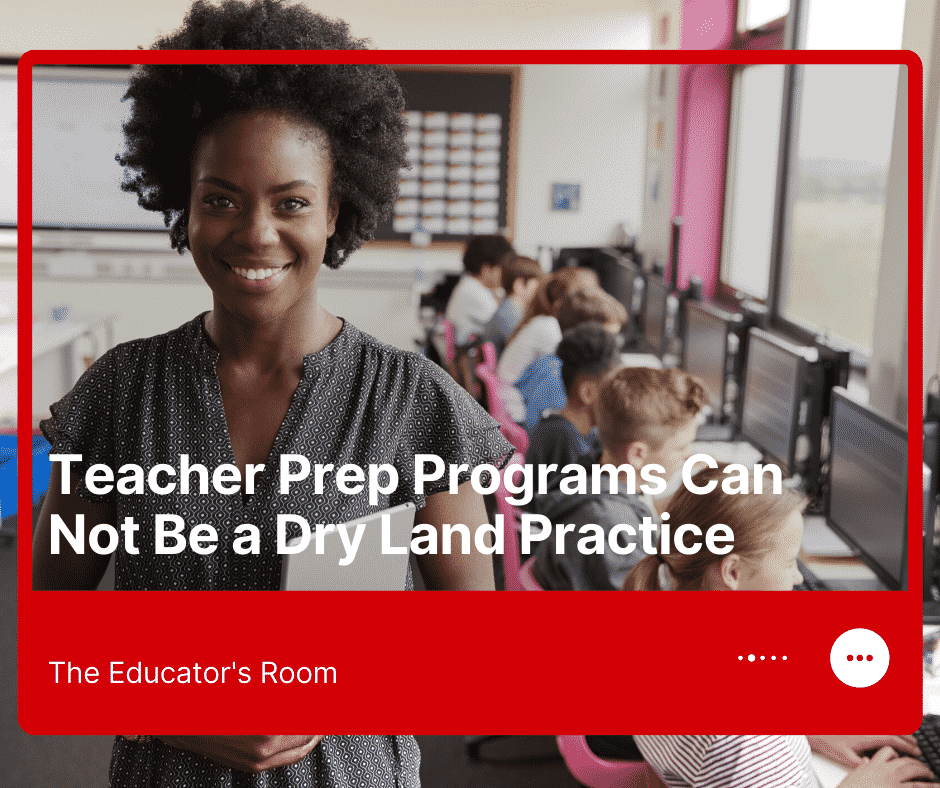“Stand up. Now, put out your right arm,” the instructor was encouraging.
“OK, pull your arm back past your body.”
We all did as we were told. This was the first night of EDR 505, a graduate level course in teaching remedial reading to pre-school and elementary aged schoolchildren.
“Now try with the other arm.”
We waved our arms erratically in the air.
He paused for a moment, looked amused and asked, “Can you teach someone to swim like this?”
We all shook our heads in agreement: “No,” “Not Really,” “Probably not.“
The 26 of us were standing in a very dry classroom.
There was no water in sight.
“Well, how can you learn to teach reading without actually working with students?”
We were surprised. Our instructor was pointing out an obvious disconnect.
“You need to be in the classroom environment.”
In this class, we were a mixed group in age and experience. Some of us were already employed as teachers; others were completing degrees in order to be hired. All of us were learning how to improve student reading from 4:30-7:30 PM on a Tuesday night in a classroom. There was not a student in sight; yet we were supposed to be training. We were learning in the abstract.
Learning in the abstract is not unusual. A large percentage of learning for students in preK through grade 12 is learning in the abstract. For 13 years, students practice skills they will use in college or in real world careers.
However, for those preparing to be teachers, the “real world” is the classroom. Our instructor was acknowledging that the classroom environment is the pool and prospective teachers and veteran should be immersed in that pool in order to learn how to teach.
Unfortunately, the pool of classrooms available for training teachers is largely unavailable. There are a number of logistical problems using the current agrarian model of education. Scheduling, supervision, and, in today’s tense climate, security are all concerns. Nevertheless, the pool environment of classroom experience is a critically important part of undergraduate teacher preparation, and a semester or two of supervised student teaching is not be enough. At minimum, there must be more integration and collaboration between the teacher training programs, graduate and undergraduate, and local classrooms that are geographically located near these programs. Teaching training programs need regular and continuous access to students.
In addition, the professors/instructors in teacher preparation programs must be current in the practices that new teachers are expected to know. They must be current on the integration of the Common Core State Standards, the surrounding controversies around the adoption of these standards, and the testing programs that have been funded to access the effectiveness of these standards. Professors/instructors must be current in their state’s evaluation programs and how the teacher competencies being evaluated. Information disseminated through handouts and powerpoint presentations on these topics is not sufficient; classroom practice in teaching strategies through simulations and extensive discussions on these standards and evaluation procedures are critically important at every level of teacher training.
Finally, the professors/instructors in teacher training programs must be familiar with the wide range of technologies being used in preK-grade 12 classrooms. The disconnect between college programs and the use of technology in real-life classrooms has been widening. The professors/instructors in today’s teacher preparation programs must develop proficiency with the software teachers are expected to use. They must be familiar with popular education software such as Google Apps for Education, Edmodo, Twitter, Quizlet, Dropbox, Khan Academy, Class Dojo, Pinterest, and Evernote. (Note: if you don’t know any of these, you may need to look as well!)
There are forces outside the education profession that are exerting pressure and changing the face of education for new and seasoned educators alike. There is political pressure from legislators designing state evaluation and curriculum standard programs combined with pressure from testing companies. The voice that is missing in response to these pressures is the voice of leadership from those who design and implement teacher training programs in colleges and universities.
Leadership from teacher training programs is not just an advertising slogan for colleges and universities to use. Leadership can not be limited as an elective course. Teacher training programs need to be under the leadership of colleges and universities whose professors/instructors are familiar with the realities of the classroom. That kind of leadership means involvement and reflection on the curriculum, instruction strategies, and means of assessment in classrooms today.
Only that kind of leadership can anticipate the trends in education today in order to design training that prepares new and veteran teachers to be successful in the classroom.

In summary, the teacher training programs currently offered by colleges and universities need to move from the abstract, from their current practice of training on dry land, in order to move teacher preparation into deep waters of classroom experience. In this current sea change of education, teacher training programs programs must become the force exerting pressure and changing the face of education. They cannot continue to let their undergraduates and graduates tread water.
Anything else is just waving arms in the air.






It is a nice post.